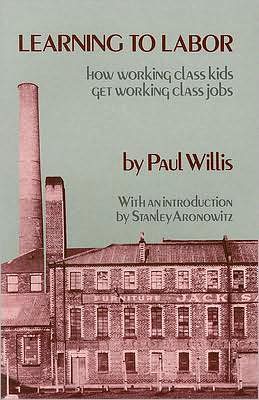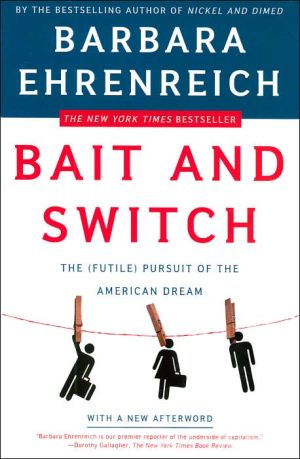The Dignity of Working Men: Morality and the Boundaries of Race, Class, and Immigration
Michèle Lamont takes us into the world inhabited by working-class men—the world as they understand it. Interviewing black and white working-class men who, because they are not college graduates, have limited access to high-paying jobs and other social benefits, she constructs a revealing portrait of how they see themselves and the rest of society.\ Morality is at the center of these workers' worlds. They find their identity and self-worth in their ability to discipline themselves and conduct...
Search in google:
Michèle Lamont takes us into the world inhabited by working-class men—the world as they understand it. Interviewing black and white working-class men who, because they are not college graduates, have limited access to high-paying jobs and other social benefits, she constructs a revealing portrait of how they see themselves and the rest of society. Morality is at the center of these workers' worlds. They find their identity and self-worth in their ability to discipline themselves and conduct responsible but caring lives. These moral standards function as an alternative to economic definitions of success, offering them a way to maintain dignity in an out-of-reach American dreamland. But these standards also enable them to draw class boundaries toward the poor and, to a lesser extent, the upper half. Workers also draw rigid racial boundaries, with white workers placing emphasis on the "disciplined self" and blacks on the "caring self." Whites thereby often construe blacks as morally inferior because they are lazy, while blacks depict whites as domineering, uncaring, and overly disciplined. This book also opens up a wider perspective by examining American workers in comparison with French workers, who take the poor as "part of us" and are far less critical of blacks than they are of upper-middle-class people and immigrants. By singling out different "moral offenders" in the two societies, workers reveal contrasting definitions of "cultural membership" that help us understand and challenge the forms of inequality found in both societies. John Solomos - Ethnic and Racial Studies Michele Lamont's study of working-class men in the USA and France is...the most interesting contribution to this field for quite some time, and should serve as a benchmark for future scholarly debate...This is a really innovative and challenging book and it needs to be read as widely as possible...The Dignity of Working Men has all the potential to become a classic.
Introduction: Making Sense of Their WorldsThe Questions The People The Research I. American Workers 1. The World in Moral Order "Disciplined Selves": Survival, Work Ethic,and Responsibility Providing for and Protecting the Family Straightforwardness and Personal Integrity Salvation from Pollution: Religion and Traditional Morality Caring Selves: Black Conceptions of Solidarity and Altruism The Policing of Moral Boundaries 2. Euphemized Racism: Moral qua Racial Boundaries How Morality Defines Racism Whites on Blacks Blacks on Whites Immigration The Policing of Racial Boundaries 3. Assessing"People Above" and"People Below" Morality and Class Relations "People Above" "People Below" The Policing of Class Boundaries II. The United States Compared 4. Workers Compared Profile of French Workers Profile of North African Immigrants Working Class Morality The Policing of Moral Boundaries Compared 5. Racism Compared French Workers on Muslims French Workers' Antiracism: Egalitarianism and Solidarity North African Responses The Policing of Racial Boundaries Compared 6. Class Boundaries Compared Class Boundaries in a Dying Class Struggle Workers on"People Above" Solidarity à la française: Against"Exclusion" The Policing of Class Boundaries Compared Conclusion: Toward a New AgendaAppendix A: Methods and Analysis Appendix B: The Context of the Interview: Economic Insecurity, Globalization, and Places Appendix C: IntervieweesNotes References Index
\ ChoiceMany interpreters of current society have posited that class is no longer a useful concept as a basis for identity. This book, based on hundreds of interviews with American and French workers, rejects that analysis...It is fascinating reading, an important contribution to a reexamination of class.\ — J. Wishnia\ \ \ \ \ \ The NationWas there actually a set of values that could be considered distinctly "working class" in character, that represented a distinctly working-class worldview? One of the most sophisticated recent attempts to answer this question appeared in the recent study The Dignity of Working Men...[Lamont] recognized that asking workers to choose their most important values from a prepared list would essentially force their replies into a predetermined mold that had little to do with their real-world thoughts and feelings. Lamont used instead open-ended and non-directive questions. She interviewed 150 blue-collar workers, black and white, in the United States and in France, and compared them with middle-class people in both countries. Her questions asked workers to describe people who were similar to them and people who were different, people they liked and disliked, and those to whom they felt superior or inferior. Follow-up questions probed why they felt as they did, spontaneously eliciting a complex pattern of moral judgements and values. Both work and family did indeed emerge among the blue-collar workers' core values. But the real significance lay in how those were perceived.\ — Andrew Levinson\ \ \ \ Ethnic and Racial StudiesMichele Lamont's study of working-class men in the USA and France is...the most interesting contribution to this field for quite some time, and should serve as a benchmark for future scholarly debate...This is a really innovative and challenging book and it needs to be read as widely as possible...The Dignity of Working Men has all the potential to become a classic.\ — John Solomos\ \ \ \ \ \ ChoiceMany interpreters of current society have posited that class is no longer a useful concept as a basis for identity. This book, based on hundreds of interviews with American and French workers, rejects that analysis...It is fascinating reading, an important contribution to a reexamination of class.\ — J. Wishnia\ \ \ \ \ The NationWas there actually a set of values that could be considered distinctly "working class" in character, that represented a distinctly working-class worldview? One of the most sophisticated recent attempts to answer this question appeared in the recent study The Dignity of Working Men...[Lamont] recognized that asking workers to choose their most important values from a prepared list would essentially force their replies into a predetermined mold that had little to do with their real-world thoughts and feelings. Lamont used instead open-ended and non-directive questions. She interviewed 150 blue-collar workers, black and white, in the United States and in France, and compared them with middle-class people in both countries. Her questions asked workers to describe people who were similar to them and people who were different, people they liked and disliked, and those to whom they felt superior or inferior. Follow-up questions probed why they felt as they did, spontaneously eliciting a complex pattern of moral judgements and values. Both work and family did indeed emerge among the blue-collar workers' core values. But the real significance lay in how those were perceived.\ — Andrew Levinson\ \ \ \ \ Ethnic and Racial StudiesMichele Lamont's study of working-class men in the USA and France is...the most interesting contribution to this field for quite some time, and should serve as a benchmark for future scholarly debate...This is a really innovative and challenging book and it needs to be read as widely as possible...The Dignity of Working Men has all the potential to become a classic.\ — John Solomos\ \ \ \ \ Library JournalLamont (sociology, Princeton) provides a fascinating look at the way working-class American and French men make sense of their world. Interviews with white and black American workingmen highlight their common commitment to doing their jobs well and remaining moral in a troubled world. However, the author finds that whites and African Americans differ markedly in their attitudes about the challenges facing low-skill workers in the high-tech economy. African Americans draw on a tradition of solidarity in the face of economic discrimination that is no longer available to their white counterparts. In comparison, French workers divide the world not along racial lines but between those workers who are culturally French and those who are Islamic immigrants to France. French workers, long exposed to socialism, also show more sympathy for the poor than do American workingmen. Lamont argues persuasively that the policy-making elite is increasingly isolated from such workers but that it is crucial that we listen to their voices and understand their concerns. Recommended for academic libraries.--Duncan Stewart, State Historical Society of Iowa Lib., Iowa City Copyright 2000 Cahners Business Information.\\\ \








